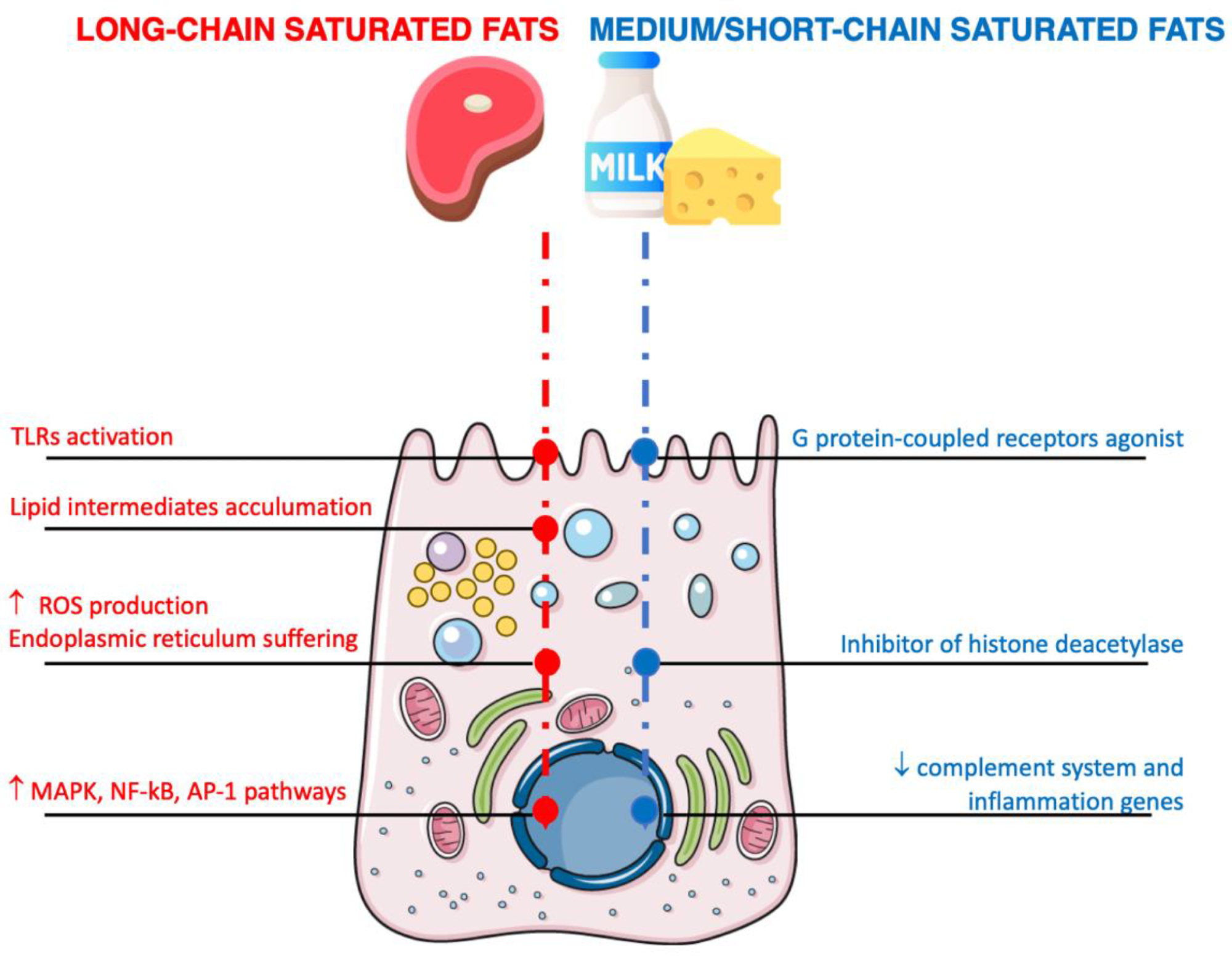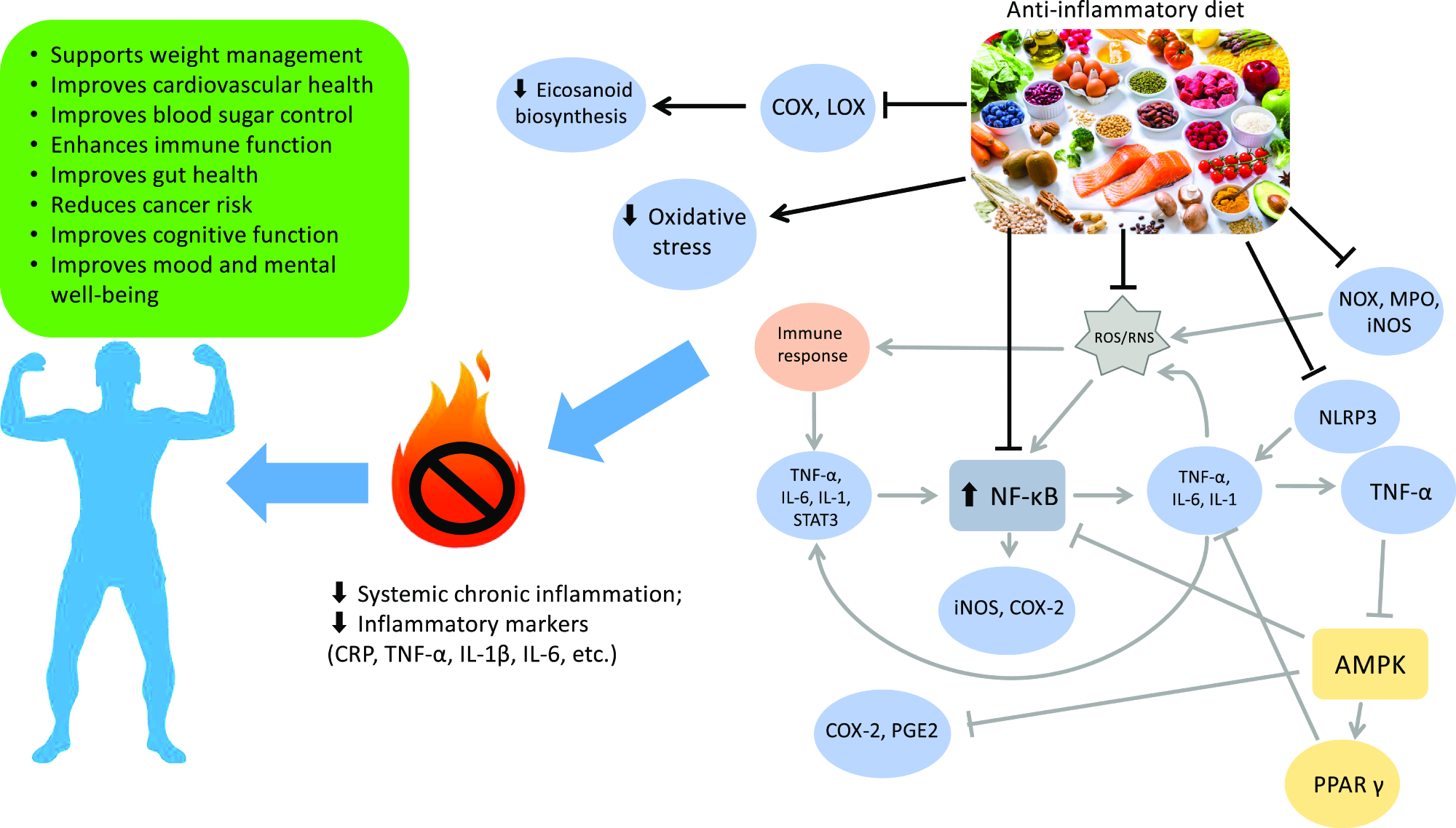Introduction
Understanding chronic inflammation
The role of diet in modulating inflammation
Key anti-inflammatory nutrients and foods
Health benefits of an anti-inflammatory diet
What the research says: Evidence and limitations
Conclusions
References
Further reading
Mounting evidence shows that specific dietary patterns can reduce systemic inflammation, protect organs, and mitigate disease risk, positioning food as a powerful therapeutic ally in the fight against chronic illnesses.
 Image Credit: New Africa / Shutterstock.com
Image Credit: New Africa / Shutterstock.com
Introduction
As the prevalence of chronic diseases rises throughout the world, persistent low-grade inflammation remains a pertinent public health concern demanding urgent attention.1 This article explains how an anti-inflammatory diet supports immune balance, gut health, and chronic disease prevention, highlighting key nutrients, foods, and scientific evidence.
Understanding chronic inflammation
Unlike acute inflammation, which provides short-term protection against injuries and infections, chronic inflammation persists subtly over extended periods, causing systemic harm without apparent symptoms. Immune dysregulation occurs when the body's immune response becomes misdirected or exaggerated, thereby damaging healthy tissues and promoting autoimmune disorders, cardiovascular disease, diabetes, and even cancers.1,2
Multiple factors contribute to chronic inflammation, the most common of which include poor dietary habits, psychological stress, exposure to environmental toxins, and disruption of the gut microbiome. For example, a diet rich in processed foods, sugars, and unhealthy fats directly increases inflammation while altering the gut microbiota, thereby leading to dysbiosis, a harmful bacterial imbalance.
 Mechanisms of action related to the effects of the inflammatory pathways of saturated fatty acids on intestinal cells. Arrows denote increment/increase or decrement/decrease.
Mechanisms of action related to the effects of the inflammatory pathways of saturated fatty acids on intestinal cells. Arrows denote increment/increase or decrement/decrease.
Stress further increases inflammation by altering the composition and function of the microbiota through hormonal and autonomic pathways, which increases the gut's permeability and ability of harmful substances to enter circulation. Environmental toxins similarly intensify immune responses, perpetuating systemic inflammation.1,2
This interplay of factors results in low-grade inflammation that silently progresses without noticeable symptoms to gradually impair organ function and overall health. Addressing these interconnected causes through diet, stress management, and gut microbiota interventions offers crucial pathways for reducing chronic inflammation.1,2
The role of diet in modulating inflammation
Diet plays a crucial role in modulating inflammation through its influence on proinflammatory and anti-inflammatory pathways. Specific dietary patterns can affect cytokine production, nuclear factor kappa-light-chain-enhancer of activated B cells (NF-κB) activation, and oxidative stress, which directly contributes to systemic inflammation. For example, dietary components like omega-3 fatty acids, fiber, polyphenols, and antioxidant vitamins reduce inflammation by moderating eicosanoid production, inhibiting NF-κB pathways, and neutralizing reactive oxygen species (ROS).3
Eating a healthy and balanced diet can also support microbial diversity, promoting the proliferation of beneficial bacteria that produce short-chain fatty acids (SCFAs), such as butyrate. SCFAs enhance the gut barrier, reduce permeability, and limit endotoxin translocation, thus reducing systemic inflammation. Conversely, diets high in fats or sugars can disrupt gut microbiota composition, thereby increasing the prevalence of proinflammatory bacterial species and exacerbating gut barrier dysfunction and inflammation.3
Adopting dietary patterns rich in anti-inflammatory nutrients, such as the Mediterranean diet, can significantly influence gut health, immune responses, and overall inflammatory status, thus highlighting the diet's important role in managing inflammatory conditions.3
Anti-Inflammatory Diet 101: What to Eat to Fight Inflammation
Key anti-inflammatory nutrients and foods
Polyphenols, omega-3 fatty acids, dietary fiber, and bioactive spices are essential components of an anti-inflammatory diet, each offering unique yet complementary health benefits. Polyphenols, which are found in berries, extra-virgin olive oil, dark chocolate, and red grapes, are recognized for their potent antioxidant and anti-inflammatory properties. For example, polyphenols reduce inflammation by inhibiting the NF-κB pathway, which in turn lowers the levels of pro-inflammatory cytokines such as tumor necrosis factor-alpha (TNF-α) and interleukin-6 (IL-6).
Omega-3 fatty acids, primarily eicosapentaenoic acid and docosahexaenoic acid, are present in fatty fish, flaxseeds, and walnuts. These dietary components reduce inflammation by decreasing leukocyte activity, suppressing the production of inflammatory eicosanoids, and lowering levels of TNF-α and IL-6. Omega-3 fatty acids also produce lipid mediators, such as resolvins and protecting, that promote the resolution of inflammation.
Spices like turmeric and ginger also increase anti-inflammatory activity within the gastrointestinal tract. Curcumin in turmeric and gingerols in ginger inhibit inflammatory enzymes and cytokines, thereby reducing chronic inflammation and oxidative stress.4
 Effects of an anti-inflammatory diet: a visual overview. Gray arrows follow the pro-inflammatory pathway, black arrows and connectors denote the effects of an anti-inflammatory diet. COX, cyclooxygenase; LOX, lipoxygenase; ROS, reactive oxygen species; RNS, reactive nitrogen species; NADPH oxidase, NADPH oxidase; MPO, myeloperoxidase; iNOS, inducible nitric oxide synthase; NLRP3, nucleotide-binding domain, leucine-rich-containing family, pyrin domain-containing-3; NF-κB, nuclear factor-kappa B; STAT3, signal transducer and activator of transcription 3; COX-2, cyclooxygenase 2; PGE2, prostaglandin E2; AMPK, AMP-activated protein kinase; PPAR-γ, peroxisome proliferator-activated receptor γ; CRP, C-reactive protein; IL-1β, interleukin 1β.4
Effects of an anti-inflammatory diet: a visual overview. Gray arrows follow the pro-inflammatory pathway, black arrows and connectors denote the effects of an anti-inflammatory diet. COX, cyclooxygenase; LOX, lipoxygenase; ROS, reactive oxygen species; RNS, reactive nitrogen species; NADPH oxidase, NADPH oxidase; MPO, myeloperoxidase; iNOS, inducible nitric oxide synthase; NLRP3, nucleotide-binding domain, leucine-rich-containing family, pyrin domain-containing-3; NF-κB, nuclear factor-kappa B; STAT3, signal transducer and activator of transcription 3; COX-2, cyclooxygenase 2; PGE2, prostaglandin E2; AMPK, AMP-activated protein kinase; PPAR-γ, peroxisome proliferator-activated receptor γ; CRP, C-reactive protein; IL-1β, interleukin 1β.4
Health benefits of an anti-inflammatory diet
Cardiovascular health
An anti-inflammatory diet supports heart health by lowering systemic inflammation, as reflected by reduced C-reactive protein (CRP) levels. Nutrients such as omega-3 fatty acids, polyphenols, and fiber enhance endothelial function, which in turn improves blood vessel flexibility and circulation. Anti-inflammatory diets also limit the oxidation of low-density lipoprotein (LDL) cholesterol, a key trigger for plaque formation and arterial inflammation, thereby reducing the risk of atherosclerosis and cardiovascular disease.4,5
Metabolic syndrome and type 2 diabetes
A diet rich in anti-inflammatory foods has shown promise in mitigating metabolic disorders, as demonstrated by several clinical trials reporting improvements in insulin sensitivity and lipid profiles. In fact, individuals following these diets often exhibit lower fasting glucose and reduced glycated hemoglobin (HbA1c) levels. By targeting chronic inflammation, these dietary patterns may disrupt the cycle linking inflammation and insulin resistance.4,6
Neuroinflammation and brain health
Anti-inflammatory diets have been widely reported to reduce the risks of Alzheimer’s disease and depression. Docosahexaenoic acid, a component of omega-3 fatty acids, along with antioxidants like flavonoids, offers neuroprotective effects by supporting the gut-brain axis, which assists in regulating immune responses and mental health.4,7
Cancer prevention and supportive care
Population studies suggest lower incidence rates of colorectal and breast cancers among individuals consuming anti-inflammatory diets. Anti-inflammatory nutrients can also aid in supportive cancer care to enhance treatment tolerance and quality of life.4,7
Autoimmune and rheumatic conditions
Individuals with autoimmune diseases like rheumatoid arthritis and lupus may experience symptom relief through dietary modifications. Anti-inflammatory foods can modulate immune activity by influencing T-cell activation and lowering pro-inflammatory cytokine release, thereby serving as a complementary strategy in managing flare-ups.3,8
What the research says: Evidence and limitations
Numerous human studies and meta-analyses suggest that an anti-inflammatory diet may offer potential benefits for managing cardiovascular disease, type 2 diabetes mellitus, and cognitive decline. However, a major limitation of these studies is the lack of a universally accepted definition of an “anti-inflammatory diet.”
As a result, studies vary widely in their dietary compositions, durations, and participant characteristics, making comparisons difficult. Many studies may also rely on self-reported dietary data and short-term trials, which limits the strength of their conclusions.
Although some randomized controlled trials show modest benefits, these results are inconsistent, particularly for outcomes such as inflammation reduction, which is independent of weight loss. Mechanistic studies are also limited, thus impeding our understanding of how specific foods affect inflammatory pathways.
More rigorous longitudinal studies and mechanistic research are needed to clarify the anti-inflammatory potential of diet and to develop standardized guidelines for clinical and public health applications.4,7
Conclusions
Diet serves as a powerful upstream tool to reduce the burden of inflammation-related diseases. As a modifiable risk factor, food provides a practical and accessible means to influence chronic inflammation and enhance health outcomes. Unlike fixed genetic risks, dietary patterns can be manipulated to prevent or manage conditions like cardiovascular disease, type 2 diabetes mellitus, and neurodegeneration.
Emerging research in personalized nutrition and epigenetics reveals that individual responses to food can vary based on genetic and molecular factors. These advances underscore the need for personalized nutrition that aligns with one’s unique biological profile for optimal anti-inflammatory effects.
References
- Pahwa, R., Goyal, A., & Jialal, I. (2018). Chronic inflammation. StatPearls Publishing. https://www.ncbi.nlm.nih.gov/books/NBK493173/
- Madison, A., & Kiecolt-Glaser, J. K. (2019). Stress, depression, diet, and the gut microbiota: human–bacteria interactions at the core of psychoneuroimmunology and nutrition. Current opinion in behavioral sciences, 28, 105-110. DOI: 10.1016/j.cobeha.2019.01.011, https://www.sciencedirect.com/science/article/abs/pii/S2352154618301608
- Kupczyk, D., Bilski, R., Szeleszczuk, Ł., Mądra-Gackowska, K., & Studzińska, R. (2025). The Role of Diet in Modulating Inflammation and Oxidative Stress in Rheumatoid Arthritis, Ankylosing Spondylitis, and Psoriatic Arthritis. Nutrients, 17(9), 1603. DOI:10.3390/nu17091603, https://www.mdpi.com/2072-6643/17/9/1603
- Yu, X., Pu, H., & Voss, M. (2024). Overview of anti-inflammatory diets and their promising effects on non-communicable diseases. British Journal of Nutrition, 1-21. DOI:10.1017/S0007114524001405, https://www.cambridge.org/core/journals/british-journal-of-nutrition/article/overview-of-antiinflammatory-diets-and-their-promising-effects-on-noncommunicable-diseases/AA3166846841DCC1B219C063F52E2A7F
- Grosso, G., Laudisio, D., Frias-Toral, E., Barrea, L., Muscogiuri, G., Savastano, S., & Colao, A. (2022). Anti-inflammatory nutrients and obesity-associated metabolic-inflammation: state of the art and future direction. Nutrients, 14(6), 1137. DOI:10.3390/nu14061137, https://www.mdpi.com/2072-6643/14/6/1137
- Magkos, F., Yannakoulia, M., Chan, J. L., & Mantzoros, C. S. (2009). Management of the metabolic syndrome and type 2 diabetes through lifestyle modification. Annual review of nutrition, 29(1), 223-256. DOI:10.1146/annurev-nutr-080508-141200, https://www.annualreviews.org/content/journals/10.1146/annurev-nutr-080508-141200
- van Zonneveld, S. M., van den Oever, E. J., Haarman, B. C., Grandjean, E. L., Nuninga, J. O., van de Rest, O., & Sommer, I. E. (2024). An Anti-Inflammatory Diet and Its Potential Benefit for Individuals with Mental Disorders and Neurodegenerative Diseases—A Narrative Review. Nutrients, 16(16), 2646. DOI:10.3390/nu16162646, https://www.mdpi.com/2072-6643/16/16/2646
- Xiang, Y., Zhang, M., Jiang, D., Su, Q., & Shi, J. (2023). The role of inflammation in autoimmune disease: a therapeutic target. Frontiers in immunology, 14, 1267091. DOI:10.3389/fimmu.2023.1267091, https://www.frontiersin.org/journals/immunology/articles/10.3389/fimmu.2023.1267091/full
Further Reading
Last Updated: Jun 17, 2025